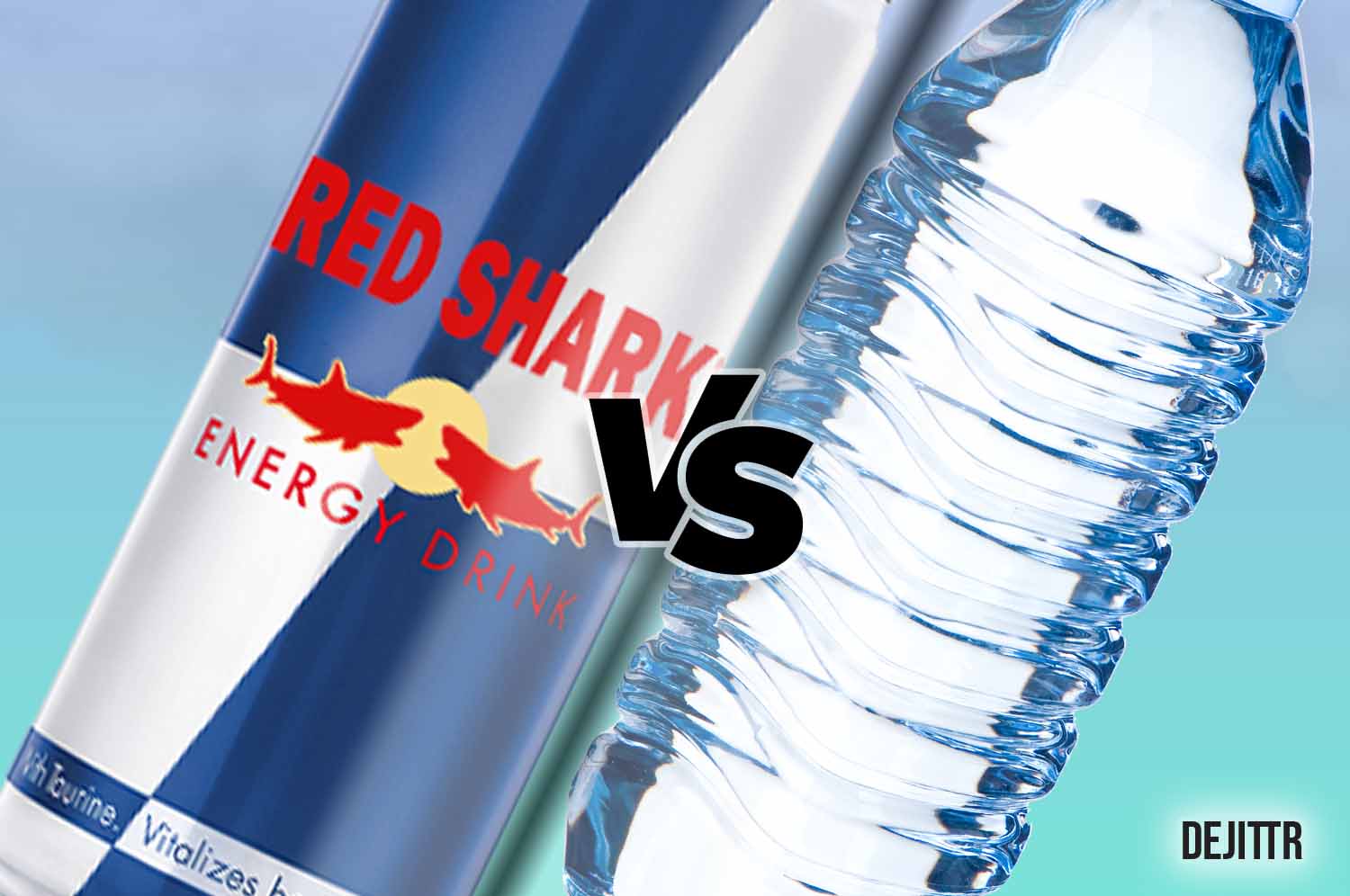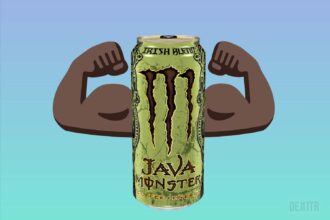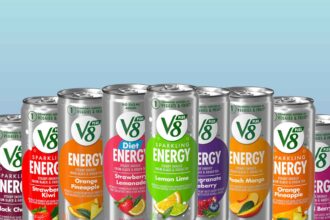Which should you choose to quench your thirst? H2O or your favorite energy drink? Let’s resolve this and compare both.
Key Takeaways:
The main difference between energy drinks and water is their contents and hydration capabilities. Water is pure and natural, free of caffeine or sugar, and is the best for hydration. On the other hand, energy drinks contain high levels of stimulants and sugar that can cause dehydration if consumed excessively.
Continue reading to learn about these drinks’ components, nutritional analyses, and benefits and downsides.
Ingredients Comparison
Here’s a list of ingredients commonly found in energy drinks:
- Carbonated Water
- Caffeine
- Taurine
- B Vitamins
- Guarana
- Ginseng
- Ginkgo Biloba
- Antioxidants
- Sugars
- Natural and Artificial Flavors
Here’s a list of ingredients in water:
- Plain H2O
- Calcium
- Magnesium
- Sodium
- Fluoride
- Chlorine
- Potassium
- Zinc
- Copper
Nutritional Comparison And Analysis
Energy Drinks:
Energy drinks are popular among those who seek to increase their energy or performance. But what constitutes an energy drink? Let’s examine energy drink components and their functions.
Energy drinks include mostly carbonated water. It creates a fizzy drink base. However, be aware that carbonated water can sometimes lead to bloating issues.
Next, energy drinks include caffeine. It boosts energy, alertness, and performance. Caffeine overdose may cause jitters, headaches, and heart palpitations.
Energy drinks also include taurine. It boosts performance and reduces muscular tiredness. Energy drinks include B vitamins including B6 and B12. They boost brain function and food conversion. Nevertheless, excessive vitamin intake might have unwanted effects.
Caffeine-containing plant guarana is also present as an ingredient. It boosts energy, attention, and endurance. Guarana overdose may cause jitters and headaches.
Next up we have ginseng root. Traditional medicine has employed ginseng root for ages. It may boost energy, brain function, and stress.
Ginkgo Biloba is a stress-reducer and brain-booster. Energy drinks incorporate it for its cognitive effects.
Energy drinks also include antioxidants like vitamins C and E for health advantages. They minimize inflammation and protect cells. Nevertheless, too much consumption of antioxidants might have unwanted effects, so a balanced diet is essential.
For sweetness, energy drinks include sugars such as high fructose corn syrup. Sugar may cause weight gain, dental damage, and diabetes.
Energy drinks get their flavor from natural and artificial flavors. Remember that artificial flavors may include substances that are unhealthy.
Water:
Water contains many necessary components that keep us healthy and hydrated. Let’s analyze water’s constituents in a bit more detail.
Water’s main constituent is H2O. Water regulates our body temperature, transports nutrients to cells, and removes waste. Staying hydrated requires drinking enough water throughout the day.
Next, calcium. Calcium strengthens bones and teeth. It regulates heart rate and muscles. Calcium consumption helps strengthen bones and prevent osteoporosis.
Please remember that although water contains many essential minerals for body functions, they are not present in sufficient quantities. For instance, if you want to benefit from calcium, consuming milk would make more sense than just water.
That said, being rich in all the minerals and electrolytes, water helps to retain proper electrolyte balance in our body.
Magnesium is another essential element. It regulates blood pressure, cardiac rhythm, and immunity. Consuming magnesium regularly can support maintaining our body’s health and normal physiological processes.
Sodium is an electrolyte that regulates fluid equilibrium in the body. It regulates blood pressure, muscles, and nerves. Drinking water with a reasonable salt level helps keep us hydrated and healthy.
Water with fluoride helps prevent tooth decay. It strengthens enamel and prevents cavities. Fluoridated water improves dental health and prevents tooth decay.
Chlorine is also added to municipal drinking water that we get in our homes to eliminate harmful bacteria that could cause illness.
Another electrolyte that regulates fluid balance is potassium. It regulates heart rhythm, muscles, and nerves. Potassium-rich water keeps us hydrated. Zinc and copper enhance our immune system and blood cells. Zinc and copper-rich water boosts immunity and prevents sickness.
Pros And Cons Of Energy Drinks
| Pros | Cons |
| Provides an energy boost | High in sugar and calories |
| Increases alertness and concentration | May cause caffeine addiction |
| Enhances physical performance | May cause dehydration |
| Improves mood and feelings of well-being | May cause heart palpitations and high blood pressure |
| Offers a variety of flavors | May interfere with sleep |
| Contains vitamins and minerals | May cause headaches and migraines |
Pros And Cons Of Water
| Pros | Cons |
| Essential for hydration | May not provide an energy boost |
| Zero calories | May not have added vitamins or minerals |
| No added sugars | May not have added flavor |
| Can be easily accessible | May not enhance athletic performance |
| Can help regulate body temperature | May not contain caffeine or other stimulants |
| Helps flush toxins from the body | May not provide mental alertness |
| Can improve skin health | May not have a desired taste |
Similarities & Differences Between Energy Drinks & Water
Energy drinks and water are both liquids, yet they are distinct. Let’s compare water with energy drinks.
First, similarities. Energy drinks and water are both sources of liquid. Water helps our bodies regulate temperature, carry nutrients to cells, and remove waste. But energy drinks help increase our energy and performance.
Secondly, both water and energy drinks are easily accessible. Whether you are in a grocery store, or at a gas station, you can easily get access to both beverages.
However, there are also significant variations between energy drinks and water. Sugar and caffeine are major distinctions.
Energy drinks are heavy in sugar and caffeine, which may cause unwanted effects if eaten in excess. Water is a healthy method to hydrate without sugar or caffeine. Also, health advantages distinguish energy drinks from water.
Energy drinks might harm our health if consumed too often, yet our bodies need water. Heart disease, high blood pressure, and obesity may result from excess energy drink intake. But, water hydrates and improves skin health.
Moreover, compared to energy drinks, water is available at a very minimal rate. Cost is a big factor to consider if you think about the long-term consumption of the beverage.
Can Energy Drinks Replace Water?
In general, energy drinks can replace water because they also act as a liquid food supplement for our body just like tea, coffee, and coconut water. But there are some things to consider.
The thing is, drinking energy drinks too frequently is harmful for the health because of its associated side effects due excess caffeine and sugar intake.
That said, if you find water to be too boring, you can sip energy drinks once in a while. However, it’s essential to never replace water because it’s the best, natural way to hydrate the body.
And be aware that energy drinks are not a great way to hydrate your body even though they contain water. Let’s see why!
Do Energy Drinks Hydrate You?
Even though energy drinks include water, they don’t hydrate well. Caffeine in energy drinks is one factor. Caffeine increases urination since it’s a diuretic. This may cause dehydration and make it difficult for your body to retain water. If overdone, caffeine may dehydrate you.
Energy drinks’ high sugar content also makes them unsuitable for hydration. Too much sugar increases water loss. Sugar increases urine because cells transfer more water. Urinating more causes water loss. Dehydration may result.
Losing water makes us thirsty, weary, and dizzy. Also, sugar causes obesity, dental decay, and other health issues.
Energy drinks may give you energy, but they don’t hydrate well. Water hydrates best since it doesn’t include caffeine or sugar. So in short, to stay healthy, drink adequate water throughout the day.
What Is The Best Beverage For Hydration?
Water is great for hydration. It regulates body temperature, transports nutrients, and removes waste. Water is the finest hydrator, although other liquids can be helpful too.
Coco water: Coconut water contains electrolytes and helps replace your body’s fluids after exercise or a day in the sun. Potassium, sodium, and magnesium regulate fluid equilibrium.
Sports drinks: Gatorade and Powerade restore electrolytes and hydrate athletes. They’re sugary, so consume them in moderation.
Herbal tea: Chamomile and peppermint are fantastic alternatives to soda and energy drinks. They may be served hot or cold and have health advantages beyond hydration.
Milk: Milk offers protein, calcium, vitamin D, and hydration. To limit saturated fat, consider low-fat or non-fat milk.
Coconut milk: Vegans and lactose intolerants can substitute coconut milk for dairy milk. Its potassium content helps control fluid balance.
Herbal-infused water: Mint, basil, and lavender provide flavor and refreshment to water. These herbs are antioxidants and healthy.
Kombucha: A fermented beverage that is strong in probiotics and low in sugar, can improve intestinal health. If you pick a low-sugar brand, Kombucha could serve as a healthy, hydrating alternative to soda or energy drinks.
Fruit-infused water: Slices of fresh fruit like lemons, strawberries, or cucumbers add taste to water. This might help you drink more water and stay hydrated.
Vegetable juice: It hydrates and provides vitamins and minerals. Seek for low-sugar, nutrient-rich juices.
It’s crucial to drink lots of water throughout the day, even if there are many healthy alternatives to water. Aim for at least eight 8 oz. glasses of water everyday, and more if active or in hot conditions.













